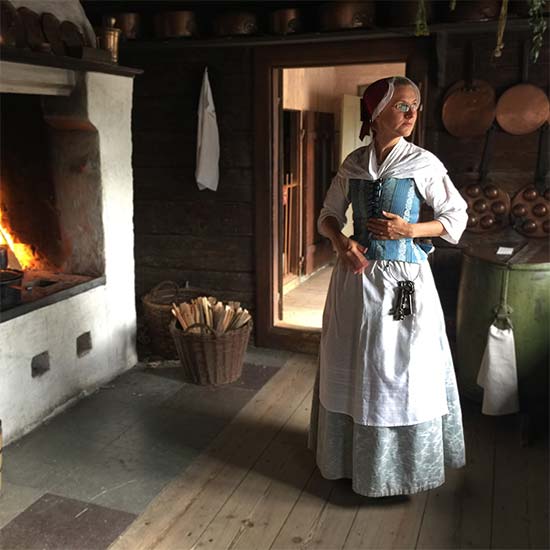Use our guides and materials to
Learn to read and speak Latin.
Start learning Latin with a free e‑mail course from Latin teacher and speaker Daniel Pettersson, M.A. Get 10 tips and principles for learning Latin.

Welcome to Latinitium.com
Sine cura sis, we’ll help you learn and practice your Latin.
Learning Latin is no easy task—at least if you want to read Latin well. It’s hard to find the right method and materials, but learning Latin is a rewarding and fun adventure.
I know. I’ve done it and helped many students do the same.
Show more
My name is Daniel Pettersson, M.A. I’ve Latin taught Latin for 10 years, privately and at university courses in Europe and in the US. Now I help people learn to speak Latin and read it without translating and hunting for the verb.
Latin is a language and I teach it as such. I speak Latin and read without translating all the time (Here is talk in Latin I gave on the subject.)
But it was not always like that. During my university studies reading without translating seemed impossible, but it couldn’t be—countless people for the last 2 millennia had done it.
So, I decided to find another way. And I did. And now I can speak, read and teach Latin with great ease. Latinitium is built on a firm belief that you can learn to understand Latin as Latin if you have good motivation, method, and material.
Our goals are to:
- show how to succeed with learning Latin
- provide you with a great source of reading and listening material
- help you discover the history and literature tied to Latin
So, if you want to learn Latin well, or are hunting for things to read, listen or watch in Latin, you are in the right place.
Let’s begin!
/ Daniel Pettersson
Let’s start
I want to…

Start learning
Practice my latin

Immerse myself in latin audio, & books
Recent articles and videos

Halloween special in Latin #8 – The procession of the Dead

How Catiline was defeated according to Sallust

Halloween Special in Latin #7 – Frightful times at Froda
Latinitium is an extraordinary resource
Written by Pamela
Latinitium is an extraordinary resource for improving one’s Latin language skills while deepening one’s cultural appreciation and having a very good time in the process. Daniel, an experienced university teacher and a gifted storyteller brings ancient, Medieval and Renaissance authors to life in readings limned with points of grammar, recondite vocabulary and historical background. Read more ->
I want to
Start learning Latin
It’s so easy to fall into bad habits and inefficient methods.
So, start off right with our tips and techniques derived from modern and 16th century pedagogy.
I want to
Practice my Latin
Now that you are already learning Latin, it’s important to add new habits, and immerse yourself in more advanced Latin. Here are a few suggestions:
I want to
Immerse myself in Latin
The only way to learn Latin well, is to immerse yourself in Latin you can understand.
With our app Legentibus you can listen and read to Latin on your smartphone and tablet easily.
All Latin texts have synchronized Latin audio.

Beginner Stories in Latin with audio and translation

Latin textbooks, e.g. Familia Romana

Latin literature, e.g. Cicero, Seneca, Tacitus
“Si forte nos, in sublime tendentes ad montis verticem, deciens praecipites devolvamur, immo centies, milliens, totiens ardentius ac inflammatiore spiritu iter idem arripiemus, ad eundem verticem terrarum advolabimus.”
— Ringelbergius, De ratione studii
“
Texts explained in Latin
Members
Videos in Latin
Get more Latin in our community
Join our community and get access to weekly videos in Latin, early access to videos, and audiobooks.
Suggest and vote on video topics and which audiobooks you would like to have.
Latin EBooks & Audiobooks
Reading or listening to a large amount of Latin that is both easily comprehensible and enjoyable is necessary for mastering the language.
Listen to and read Latin anywhere with the Legentibus app for smartphones and tablets.
Online Latin dictionaries
Here you will find four online Latin dictionaries; Lewis & Short’s Latin-English dictionary, Smith & Hall’s English-Latin dictionary, Döderlein’s Handbook of Latin synonyms, and Ogilvie’s treatise on Latin synonyms, Horae Latinae.
We have gathered them in the same place so that you can freely use and search them all at once while reading, learning, writing and translating Latin.
Keep Latinitium going
Latin is not the best way to make money, as they would have you believe. Latinitium exists because people like you buy our products, join our community, or donate.
We have many planned projects for Latin learners and teachers, which require much time and resources.
Our passion is great but our resources very limited. If you find Latinitium useful, please consider making a donation by clicking the button below.
Who’s behind Latinitium?
Latinitium.com is run by Daniel Pettersson and Amelie Rosengren. We also host guest writers from inside of academia and outside.

Daniel Pettersson
Teacher, scholar, speaker
Daniel Pettersson, M.A., is co-founder of Latinitium and is Latin teacher. He has taught in Europe and the US and is currently working on his PhD dissertation on Humanist Colloquia. Daniel believes in the importance of Latin literature in the modern world, and that you can teach yourself Latin with the right motivation, method and material.

Amelie Rosengren
Historian, scholar, author
Amelie Rosengren, M.A. and co-founder of Latinitium, is a published author, illustrator and historian. She specializes in daily life, has a soft spot for historic curiosities, and works as a museum educator at the world’s oldest open-air museum, Skansen.

Frequently Asked Questions
I want to start learning Latin, which is the best way?
(1) Start by writing down clearly why you want to learn Latin. This will help to motivate you later if things get tough. (2) Get the essential books starting with Familia Romana I with the exercise book. (3) Now, establish a daily study habit, and diligently work your way through the book doing all the exercises, and rereading each chapter many times, until you understand everything with ease. To learn faster, read and listen to our easy stories in Easy Latin retelling myths and stories from antiquity, the bible, and norse mythology .
What are your easiest Latin materials?
Our easiest materials is our growing library of Beginner stories available in our Latin audiobook & e‑book app Legentibus. They all have (1) Latin text, (2) Recording, (3) Word-for-word translation, (4) commentary.
Why are there so much videos and audio in Latin here?
Latin is a language, and to learn a language very well you have to read and listen to as much of it as possible, you have to get what second language researchers call “comprehensible input”, material that you can understand without translating. However, the extant Latin literature is generally too difficult for most learners to read in this way. They need bridging materials that are easier but still use the same style and grammar. The videos, articles, and audiobooks in Latin here help to provide that bridge.
What Latin is used in the videos, and easier books?
We are very adamant about using attested language from classical literature, which is what most students want to read.
Therefor, all our videos, articles, and books use the words, expressions, and syntax that is found in Classical literature. Since the videos are usually extemporaneous, the sentences are briefer, more akin to the language of Roman playwrights, than to the long and windy sentences of Roman oratory.
Why learn Latin?
If you know Latin well, it’s the closest thing to time travel: you can read texts written by people who lived in ancient Rome 2000 years ago, or by people who lived in the middle ages during the black plague, or the renaissance during the 16th and 17th centuries—the first descriptions of newly discovered places, plants, and animals. It is an endless source of fascination.
Is Latin a dead language?
Yes. Or rather, Latin is immortal. Latin as a living natural language, subject to natural change over time, evolved into the Romance languages, such as French, Italian, and Spanish.
However, Latin as the language of learning, of the church, of literature, and diplomacy continued through the middle ages and the renaissance into the 18th century. Since Latin was no longer the native language of anyone, it was fairly stable and did not change much (with some exceptions).
Even today we are many who speak Latin as a means to better learn the language—and also because it is fun.
How long does it take to learn Latin?
As a general rule, to master Latin as to be able to read most classical literature with relative ease and little translation takes around five years of diligent study (multiple hours a day). Factors such as method, dedication, and experience will impact on the time it takes to learn Latin.
If you want to get a grasp of the language, for fun, or for some light historical research, you can do with six months studying a few hours each day.
How long does it take to learn to speak Latin fluently?
If you want to learn to speak Latin in a way that actually helps you read Latin literature, it will take many years of study, because you have to speak using the same grammar and vocabulary that the literature does. By constantly using a word or phrase incorrectly in speaking, you may, when reading, misunderstand the same word or phrase. This is not a big problem, if you always read a lot of idiomatic Latin, as it will reinforce historical usage.
If you want to get get a grasp of the language, for fun, or for some light historical research, you can do with six months studying a few hours each day.
How long does it take to read Latin well?
It takes many years to be able to read classical Latin literature well, without translating and analysing the grammar of every other sentence. It takes time because Latin literature, especially classical Roman literature, was written for a highly educated elite, who enjoyed a polished, elegant language. In addition, the completley alien historical context of Rome 2000 years ago requires us to learn an immense amount about the history and culture to able to understand texts well. Thus learning Latin well is de facto understanding the historical context.
If you want to get get a grasp of the language, for fun, or for some light historical research, you can do with six months studying a few hours each day.
I’ve learned Latin with Grammar translation, should I stop that?
No, but add to it. The best way to learn Latin is to read as much Latin as possible at your level, so that you can read or listen to a text and understand it fairly well without translating.
Combine this type of easier reading with traditional grammar study and some translation and you will master Latin at a very high level.
Is Latin pronunciation important?
Yes and no. If you read Classical Latin literature, and especially poetry, you should strive to learn to pronounce short and long vowels as well as double consonants. These things will ensure that you can read classical poetry and enjoy its rhythm which is built on the interplay between long and short syllables. Don’t worry about the precise sound of a particular vowel, unless you are fascinated by that type of thing. If you only want to read medieval Latin, you could spend less time with vowel length, even though it is easily learned from listening to good recordings.
Who is Daniel Pettersson?
Daniel is a Latin teacher who has taught Latin for the past decade using a combination of spoken Latin and traditional methods. He commonly speaks at Latin conferences, and has taught university courses in Latin in Europe and in the US. Currently he is researching 16th century Latin school dialogues and their pedagogy. He believes in learning Latin methodically and accurately while still having a lot of fun.












